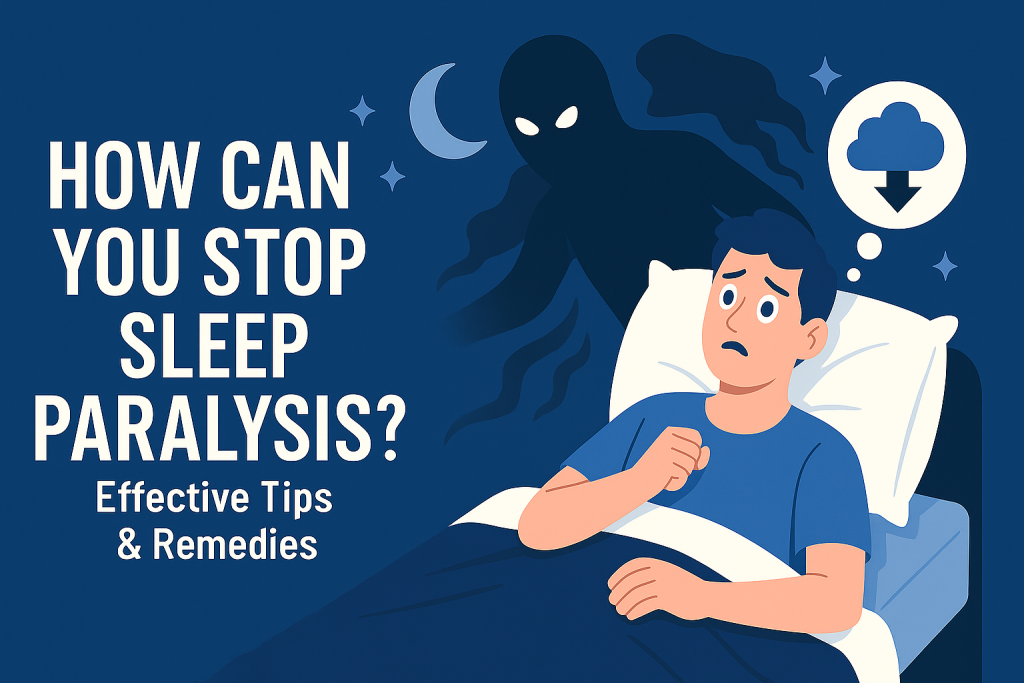Sleep paralysis can be a frightening and disorienting experience. It occurs when you temporarily lose the ability to move or speak while falling asleep or waking up, often accompanied by vivid hallucinations and a sense of pressure on the chest. If you’re wondering, “how can you stop sleep paralysis?” you’re not alone. Many people experience this phenomenon, and fortunately, there are actionable steps you can take to reduce its frequency and intensity.
Understanding Sleep Paralysis
Before exploring solutions, it’s essential to understand what sleep paralysis is and why it happens. Sleep paralysis is classified as a parasomnia—an abnormal behavior during sleep. It typically occurs during transitions between wakefulness and sleep, specifically during REM (rapid eye movement) sleep, when your brain is active, but your muscles are temporarily paralyzed to prevent you from acting out dreams.
When you regain consciousness before the REM cycle ends, you may find yourself awake but unable to move or speak. This can last from a few seconds to several minutes and often causes significant anxiety.
Main Causes of Sleep Paralysis
Sleep paralysis can affect anyone, but certain factors increase its likelihood. Common causes include:
- Sleep deprivation or irregular sleep schedules
- High stress and anxiety levels
- Sleep disorders such as narcolepsy or insomnia
- Sleeping on your back
- Medications or substance use
- Genetic predisposition
How Can You Stop Sleep Paralysis? Proven Strategies
While occasional episodes of sleep paralysis are usually harmless, frequent occurrences can disrupt your sleep and well-being. Here are some evidence-based strategies to help prevent and stop sleep paralysis:
1. Improve Your Sleep Hygiene
Good sleep hygiene is the foundation of preventing most sleep disturbances, including sleep paralysis. Consider these tips:
- Maintain a regular sleep schedule: Go to bed and wake up at the same time every day, even on weekends.
- Create a bedtime routine: Engage in calming pre-sleep rituals, such as reading or meditating.
- Optimize your sleep environment: Ensure your bedroom is quiet, dark, and cool. Use comfortable bedding and eliminate noise and light disturbances.
2. Manage Stress and Anxiety
High stress levels can disrupt your sleep cycle and increase the likelihood of sleep paralysis. Effective stress management techniques include:
- Mindfulness and meditation: Practicing mindfulness or guided meditation before bed can calm your mind.
- Breathing exercises: Deep breathing or progressive muscle relaxation can help your body relax.
- Physical activity: Regular exercise reduces anxiety and promotes better sleep, but avoid vigorous workouts close to bedtime.
3. Adjust Your Sleeping Position
Research indicates that sleeping on your back increases the risk of sleep paralysis. If you’re prone to episodes, try:
- Sleeping on your side: Use pillows to maintain a comfortable side-sleeping position.
- Body pillows: These can prevent you from rolling onto your back during sleep.
4. Address Underlying Sleep Disorders
Conditions like narcolepsy, sleep apnea, or insomnia increase susceptibility to sleep paralysis. If you suspect a sleep disorder, consult a healthcare professional for a proper diagnosis and treatment plan. Addressing these issues can significantly reduce episodes.
5. Avoid Stimulants and Heavy Meals Before Bed
- Caffeine and nicotine: Stimulants can disrupt sleep quality. Avoid them at least six hours before bedtime.
- Alcohol and heavy meals: Though alcohol may make you drowsy, it disrupts REM sleep. Large or spicy meals can also interfere with sleep patterns.
6. Gradual Sleep Adjustments
If you’ve been experiencing sleep deprivation or irregular sleep hours, try adjusting your schedule gradually. Sudden changes can increase your risk for sleep paralysis episodes. Shift your bedtime by about 15 minutes per night until you reach your goal.
Coping with Sleep Paralysis When It Happens
Despite preventive efforts, sleep paralysis can occasionally occur. Here’s how to cope in the moment:
- Stay Calm: Remind yourself that sleep paralysis is not dangerous and will pass in a few moments.
- Focus on moving small muscles: Try moving your fingers, toes, or facial muscles to break the paralysis.
- Regulate your breathing: Take slow, deep breaths to help your body relax.
- Mentally reassure yourself: Positive self-talk can reduce fear and anxiety during an episode.
If hallucinations occur, remember they are a natural part of the sleep cycle and not real.
When to Seek Professional Help
Most cases of sleep paralysis are harmless and infrequent. However, if you experience frequent, severe, or distressing episodes that interfere with your daily life, it’s time to consult a sleep specialist. Medical evaluation may be needed if you have:
- Severe anxiety or depression alongside sleep paralysis
- Signs of other sleep disorders (e.g., chronic insomnia, excessive daytime sleepiness)
- Episodes with physical symptoms, such as gasping or choking
Sleep specialists can perform sleep studies and recommend treatments, including cognitive-behavioral therapy, medication, or other targeted interventions.
Frequently Asked Questions About Stopping Sleep Paralysis
Can you completely stop sleep paralysis?
While some people may never experience sleep paralysis again after addressing triggers, others may have occasional episodes. However, following the prevention strategies above can dramatically reduce the frequency and severity.
Are there natural remedies for sleep paralysis?
Yes. Improving sleep hygiene, reducing stress, and making lifestyle adjustments are all-natural ways to prevent most cases of sleep paralysis without medication.
Is sleep paralysis dangerous?
Although terrifying, sleep paralysis is typically harmless. It does not cause physical harm but can be associated with other sleep disorders that need attention.
Conclusion: Regain Restful Sleep & Peace of Mind
If you have been troubled by sleep paralysis, you now know there are several ways to stop or reduce its impact. By focusing on sleep hygiene, stress management, and addressing underlying sleep issues, you can minimize the chances of recurrence. Remember, occasional sleep paralysis is common and usually nothing to fear. If episodes persist, seeking professional support can help you achieve restful and restorative sleep once again.

